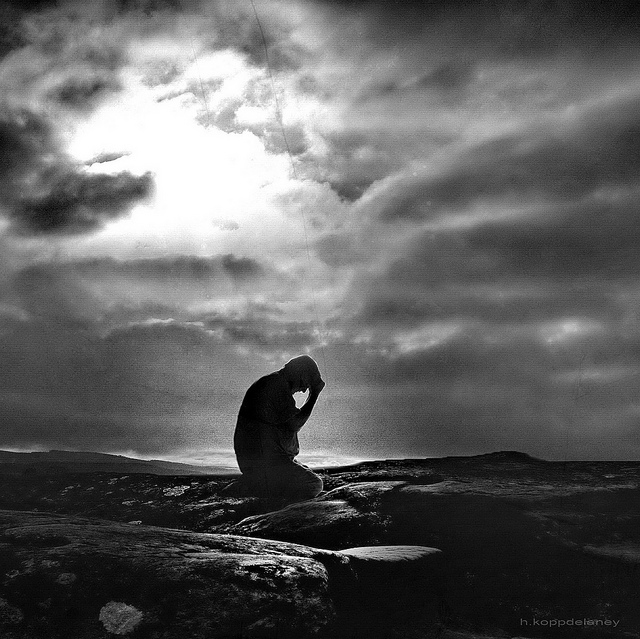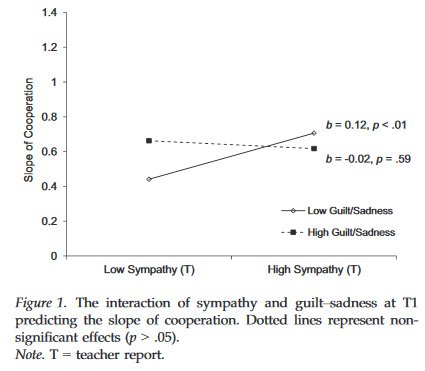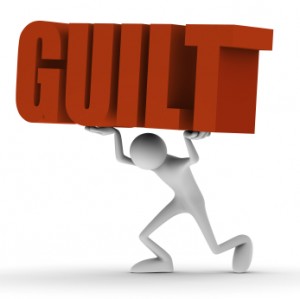Feelings of Guilt are Necessary to Develop Healthy Moral and Pro-Social Individuals
Guilt and shame are often looked at as unwelcome intruders. Is it really healthy for us to ignore these feelings? Can we recognize these feelings as helping to serve us in our betterment and long-term well-being, rather than see them as hindering our short-term well-being?

Source
I've recognized legitimate guilt and shame as necessary cues and signals in moral development. These feelings are physiological reactions that act as a signal to get us to face the dark side of the wrongs we engage in, to accept responsibility and culpability for the actions we create.
I say legitimate, because people can blame, shame and guilt-trip us with false, invalid and irrational claims when we did nothing wrong. And we can do it to ourselves by falsely attributing causation from our actions. We need to be honest with ourselves in order to assess if we are doing something wrong or not.
Offend and Insult Ourselves
The emotional compass in life is very useful if we listen to it. It can be manipulated as well. Many people have a stagnant or deadened conscience that they don’t pay attention to or listen to for feedback about their actions. We need to connect to ourselves more, to listen and see how we insult and offend ourselves by our own actions.
Darkness to Light
If someone tells us the truth about our wrong-actions, they are doing us a service by bringing the darkness to light. They are not simply being "judgmental" or trying to "shame" us. Truth is love, love is truth. Truth unites, lies divide. Love embraces truth. Fear rejects truth. Speaking truth is an act of love.
Other people don't make us do the actions we engage in, but they can call us out when we do something demonstrably wrong. We only have ourselves to blame for the insult, offense, shame and guilt we feel.
Guilt and other emotions are teachers in our lives. They can help us grow.
That's my preexisting understanding before I even read about a study I will talk about.
A study published in Child Development also talk about how guilt is an important and healthy part of personal growth. The author did a 6-year-long longitudinal study of children aged 6 to 12, looking at** sympathy, guilt and moral reasoning**, and how they help children develop cooperation, sharing and other pro-social behaviors.
Consequences to Actions
Understanding that someone is affected by our actions is important. Comprehending the feelings of others takes time to develop as a child. The capacity to control our own emotions and impulses increases with age as we coordinate emotions with our thoughts. We learn to reflect and change how we feel and what we do.
Understanding the consequences of our behavior helps to develop other-oriented social skills like empathy and kindness. We learn that harming others -- such as taking a toy away from another who is playing with it -- is wrong. We see the unhappiness in another that we create as a result of our actions. We learn to show remorse and make amends through reparative behavior (reparations), such as giving the toy back, or doing something nice as form of apology.

Source
Sympathy, Cooperation, Helping and Sharing
Having sympathy (affective concern for others) correlates consistently with helping and cooperating, meaning sympathy is a strong motivator for pro-social behavior. Higher levels of guilt and sadness also predicted higher levels of sharing, which is the most costly of pro-social behavior. The other two pro-social behavior of helping and cooperating don't involve the loss of an item being shared. The self-conscious feelings of guilt-sadness seem to develop after sympathy, and may be a motivational foundation for sharing.
Children with low guilt-sadness but high sympathy had an increase in cooperation. Children with high guilt-sadness or moral reasoning were high in cooperation independent of sympathy, but high levels of sympathy increased cooperation for children 6 and 9 years old. Children aged 12 shared less with nonfriends compared to younger children.
Mistaken Guilt
Instilling guilt by explaining the consequences of an action is positive. But feelings of guilt for something we has no control over -- such as a parent's divorce -- is not a healthy form of guilt. Feeling too much guilt is not so helpful though, and can harm us. Thoughts about how we think we and our behavior are the cause of other people's unhappiness can be mistaken, and lead us to unhealthy conclusions.
Falsely attributing guilt to ourselves or someone else can result in a guilt that won't go away because it's not based on the reality of our actions affecting someone else. This can lead to harmful and unhealthy results.
Responsibility and Burden to Bear
Guilt can be a heavy burden to bear. We need to do something about the wrong behavior we did, preferably to learn from our mistakes, change our behavior, and engage in reparation to makeup for a past wrong. This will remove the burden and weight of guilt. Ignoring, denying or dismissing the guilt and responsibility for our actions doesn't help us grow morally or pro-socially. We can end up repeating past behaviors or mistakes.
Living with Others Peacefully
Learning about rules of conduct by seeing how our actions have consequences on others, and feeling guilt for it, is beneficial to help us learn to live together peacefully. As long as the actions we feel guilty about are responsible for the resulting consequences in others, then we can learn to be better pro-social and moral beings.
- Do you see a positive side to feelings of guilt?
- How do you deal with feelings of guilt?
- Are you overwhelmed when you feel guilt, not knowing how to deal with it?
Thank you for your time and attention. Peace.
If you appreciate and value the content, please consider: Upvoting, Sharing or Reblogging below.
 me for more content to come!
me for more content to come!
My goal is to share knowledge, truth and moral understanding in order to help change the world for the better. If you appreciate and value what I do, please consider supporting me as a Steem Witness by voting for me at the bottom of the Witness page; or just click on the upvote button if I am in the top 50.


The imperfection of human being; we make mistakes and the emotional guilt developed amongst us to become more rational and civilized being. Our guilt in our past experience should not be avoided, but rather acknowledged it and do something to become a better you. Having a sympathy or compassion is a rare form of human being and usually it is one of the traits of a leader. We help people because of our guilt experiences, being compassionate with guilt driven will motivate people with a sense of togetherness and harmony. :)
Yes when my sweetheart passed away, I went through guilt blaming myself thinking there were things I could have done to prevent it. I did get some counseling. Today I realize it was beyond my control, as a higher power was involved. I think having a conscience and feeling the emotions you describe are necessary. I fear the lack of those feelings should we ever embrace the singularity and merge with artificial intelligence. Thanks for your article @krnel
You're welcome. Thanks for the personal feedback on your experience :)
Pride is one strong thing that makes so comfortable and glad while doing the wrong thing. Nice post @krnel
Upvoted!
Indeed, people can be proud to be doing wrongs by thinking they are right. Psychos know they are doing wrong and are proud of it :/
i can see many positives of feeling guilt!
People who are prone to guilt tend to work harder and perform better than people who are not guilt-prone, and are perceived to be more capable leaders.
not only that
people who often feel guilty are better friends, lovers
I would tend to agree. Thanks for the feedback.
There's an inbuilt mechanism in us all, conscience, it serves as an internal judge which regulates our conducts and accuses us each time we did wrong. Feeling of guilt arising from conscientious judgement can create a sense of responsibility in us for our actions.
Yes, conscience is our compass. It's our moral comprehension of the past to guide us into the future.
I was fascinated by the phrase "My goal is to share knowledge, truth and moral understanding in order to help change the world for the better." Hopefully your goals are not betrayed.
I will vote you to be my witnes
Thank you for the support :)
sometimes ego does not allow us to be ashamed and feel guilt for wrong doing,
yea, very true @diya28
Yup, our ego-I-self-identity (ego-personality-identity construct as I call it) get defensive when confronted with our false ways or living.
I strongly agree
we must always feel guilty to never be satisfied with the good we have done that will make us better.
yea, right @moersal
wow well post keep it up.... thanks for shareing
it is a matter that often comes in the life of every person. each has their own social problems. Your post is very interesting @krnel